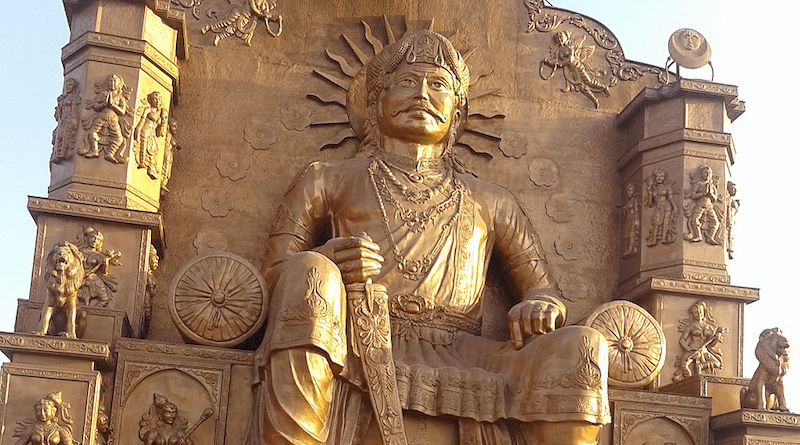Vikramaditya: The Legendary King Of Ancient India – OpEd
Vikramaditya was a legendary emperor of ancient India, whose reign is believed to have taken place between 380-415 CE. According to a popular legend, Vikramaditya was the son of the King of Ujjain, and was known for his wisdom, valor, and generosity. He established his empire by defeating several powerful kingdoms in the Indian subcontinent, and is regarded as one of the greatest kings in Indian history.
In addition, Vikramaditya is also known for his patronage of arts and literature, and is said to have gathered a court of scholars, poets, and artists in his capital city of Ujjain. The famous Sanskrit poet Kalidasa is believed to have been one of his courtiers, and many of his works are said to have been composed under the patronage of the king. He is famous for his patronage of literature and the arts, Vikramaditya is also said to have been a just and benevolent ruler.
Vikramaditya is said to have abolished cruel punishments such as mutilation and banishment, and to have established a fair and impartial justice system. The historical accuracy of the Vikramaditya legend is difficult to determine, and many aspects of his life and reign remain shrouded in mystery. Nevertheless, he remains a popular and revered figure in Indian folklore and mythology.
Early life and times
Vikramaditya was the son of King Gandharvasena of Ujjain, a city in present-day Madhya Pradesh, India. He was born under auspicious circumstances and was said to have possessed extraordinary wisdom, valor, and physical strength from a young age.
As he grew up, Vikramaditya was trained in the art of warfare, archery, and horse riding, as well as in the principles of governance and administration. He was also said to be a devout follower of Hinduism and was well-versed in the scriptures and religious texts of his time.
According to legend, Vikramaditya ascended to the throne of Ujjain after his father’s death and soon set out to expand his kingdom. He is said to have defeated several powerful kingdoms in the Indian subcontinent, including the Shakas, the Huns, and the Mlechhas. His military conquests are said to have established him as one of the most powerful kings of his time. He is also said to have commissioned the construction of several temples and religious monuments, including the famous Mahakal Temple in Ujjain.
He is regarded as a just and benevolent ruler who was loved and respected by his people. In administration, he abolished cruel and unusual punishments and established a fair and impartial justice system. He is also known as a champion of the poor and the downtrodden and to have taken several measures to improve their lives. However, despite controversies, his legacy as a great king and patron of arts and literature continues to inspire people in India and beyond.
Welfare schemes of the king
The legend of Vikramaditya, the ancient king of India, is associated with several welfare schemes that he is said to have initiated for the benefit of his people. His reputation as a just and benevolent ruler who cared deeply about the welfare of his subjects is known to all and some of his welfare schemes include:
a. Abolishing cruel punishments: According to legend, Vikramaditya abolished cruel and inhumane punishments such as mutilation and banishment. Instead, he established a fair and impartial justice system that was based on principles of equity and justice.
b. Protecting women’s rights: Vikramaditya is said to have taken several measures to protect women’s rights and ensure their safety and security. He established special courts to deal with cases of crimes against women and implemented strict penalties for such offenses.
c. Providing relief to the poor: Vikramaditya is said to have been a champion of the poor and the downtrodden. He is said to have implemented several measures to provide relief to the poor, including distributing free food grains, setting up hospitals and dispensaries, and providing financial assistance to those in need.
d. Promoting education: Vikramaditya was a patron of learning and education. He is said to have established several schools and colleges and provided scholarships to deserving students. He is also said to have invited scholars and intellectuals from across the world to his court and patronized the arts and culture.
Contributions of the king
The ancient Indian king Vikramaditya’s contribution to politics and society include:
a. Governance and Administration: Vikramaditya is said to have established a just and efficient system of governance and administration in his kingdom. In administration, he appointed able and honest officials to key positions and to have implemented a fair and impartial justice system. He is also said to have abolished cruel and unusual punishments and established a system of checks and balances to prevent corruption and abuse of power.
b. Military Conquests: Vikramaditya conquered several powerful kingdoms in the Indian subcontinent, including the Shakas, the Huns, and the Mlechhas. His military conquests are said to have established him as one of the most powerful kings of his time.
c. Patron of Arts and Literature: Vikramaditya is said to have established a court of scholars and artists in his capital city of Ujjain, which included famous poets and writers like Kalidasa, Amaru, and Varahamihira.
d. Religious Tolerance: Vikramaditya is said to have been a champion of religious tolerance and to have respected the beliefs and traditions of all his subjects and patronised several religions, including Hinduism, Buddhism, and Jainism, and to have encouraged inter-faith dialogue and cooperation.
e. Welfare Schemes: Vikramaditya is said to have initiated several welfare schemes for the benefit of his people, including providing relief to the poor, protecting women’s rights, and promoting education.
Dr. Rajkumar Singh is a Youth Motivator, presently Professor of Political Science and Dean, Student’s Welfare (DSW), at B.N. Mandal University, Madhepura (Bihar), India. His 23 books published in addition to 900 articles in national and international journals and daily newspapers from 25 foreign countries.

